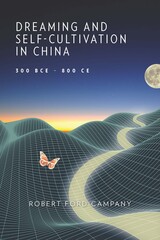
Winner of the Stanislas Julien Prize
Winner of the Joseph Levenson Prize for Scholarship on Pre-1900 China
Dreaming is a near-universal human experience, but there is no consensus on why we dream or what dreams should be taken to mean. In this book, Robert Ford Campany investigates what people in late classical and early medieval China thought of dreams. He maps a common dreamscape—an array of ideas about what dreams are and what responses they should provoke—that underlies texts of diverse persuasions and genres over several centuries. These writings include manuals of dream interpretation, scriptural instructions, essays, treatises, poems, recovered manuscripts, histories, and anecdotes of successful dream-based predictions.
In these many sources, we find culturally distinctive answers to questions peoples the world over have asked for millennia: What happens when we dream? Do dreams foretell future events? If so, how might their imagistic code be unlocked to yield predictions? Could dreams enable direct communication between the living and the dead, or between humans and nonhuman animals? The Chinese Dreamscape, 300 BCE–800 CE sheds light on how people in a distant age negotiated these mysteries and brings Chinese notions of dreaming into conversation with studies of dreams in other cultures, ancient and contemporary. Taking stock of how Chinese people wrestled with—and celebrated—the strangeness of dreams, Campany asks us to reflect on how we might reconsider our own notions of dreaming.


Practitioners of any of the paths of self-cultivation available in ancient and medieval China engaged daily in practices meant to bring their bodies and minds under firm control. They took on regimens to discipline their comportment, speech, breathing, diet, senses, desires, sexuality, even their dreams. Yet, compared with waking life, dreams are incongruous, unpredictable—in a word, strange. How, then, did these regimes of self-fashioning grapple with dreaming, a lawless yet ubiquitous domain of individual experience?
In Dreaming and Self-Cultivation in China, 300 BCE–800 CE, Robert Ford Campany examines how dreaming was addressed in texts produced and circulated by practitioners of Daoist, Buddhist, Confucian, and other self-cultivational disciplines. Working through a wide range of scriptures, essays, treatises, biographies, commentaries, fictive dialogues, diary records, interpretive keys, and ritual instructions, Campany uncovers a set of discrete paradigms by which dreams were viewed and responded to by practitioners. He shows how these paradigms underlay texts of diverse religious and ideological persuasions that are usually treated in mutual isolation. The result is a provocative meditation on the relationship between individuals’ nocturnal experiences and one culture’s persistent attempts to discipline, interpret, and incorporate them into waking practice.

Practitioners of any of the paths of self-cultivation available in ancient and medieval China engaged daily in practices meant to bring their bodies and minds under firm control. They took on regimens to discipline their comportment, speech, breathing, diet, senses, desires, sexuality, even their dreams. Yet, compared with waking life, dreams are incongruous, unpredictable—in a word, strange. How, then, did these regimes of self-fashioning grapple with dreaming, a lawless yet ubiquitous domain of individual experience?
In Dreaming and Self-Cultivation in China, 300 BCE–800 CE, Robert Ford Campany examines how dreaming was addressed in texts produced and circulated by practitioners of Daoist, Buddhist, Confucian, and other self-cultivational disciplines. Working through a wide range of scriptures, essays, treatises, biographies, commentaries, fictive dialogues, diary records, interpretive keys, and ritual instructions, Campany uncovers a set of discrete paradigms by which dreams were viewed and responded to by practitioners. He shows how these paradigms underlay texts of diverse religious and ideological persuasions that are usually treated in mutual isolation. The result is a provocative meditation on the relationship between individuals’ nocturnal experiences and one culture’s persistent attempts to discipline, interpret, and incorporate them into waking practice.
READERS
Browse our collection.
PUBLISHERS
See BiblioVault's publisher services.
STUDENT SERVICES
Files for college accessibility offices.
UChicago Accessibility Resources
home | accessibility | search | about | contact us
BiblioVault ® 2001 - 2024
The University of Chicago Press









